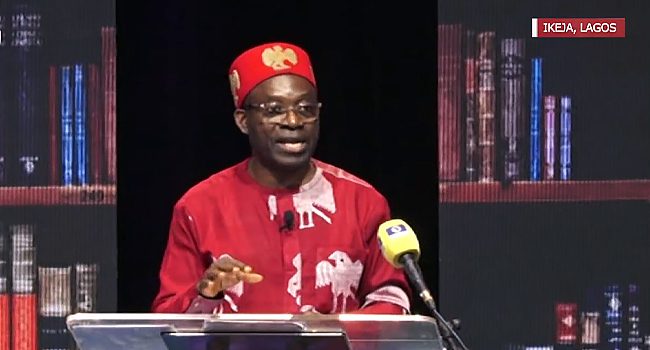Headlines
Soludo Supports Single Term for Politicians, Opposes Local Government Autonomy

Anambra State Governor Chukwuma Soludo expressed his support for the idea of a single term for elected officials, but he strongly disagreed with granting autonomy to local government areas in the country, as he believed it goes against the principles of true federalism.
During The Platform Nigeria event, which was organized by Covenant Nation to commemorate Democracy Day 2024, Soludo, who served as the Governor of the Central Bank of Nigeria from 2004 to 2009, proposed the establishment of a single-parliament National Assembly due to the country’s declining revenue.
The event, themed ‘Democracy and the Free Market Economy,’ featured notable figures such as former Minister of Works Babatunde Fashola, Bishop Matthew Hassan-Kukah of the Catholic Diocese of Sokoto, and former Speaker of the House of Representatives Yakubu Dogara.
Soludo acknowledged that the idea of a single term for elected officials might have some merit, regardless of its duration, whether it be four, five, six, or seven years. He emphasized that such a system would allow leaders to focus on governance rather than constantly worrying about the next election. Soludo shared his personal experience of facing pressure to delay projects due to upcoming elections, stating that he believes it is important to prioritize the task at hand.
While there is a growing demand for local government autonomy in Nigeria, with even President Bola Tinubu supporting the cause, Governor Soludo holds a different perspective. He expressed concern that granting autonomy to local governments, including some members of the All Progressives Congress (APC), would deviate from the essence of true federalism and set the country back several decades.
In summary, Governor Soludo supports the idea of a single term for elected officials but opposes the autonomy of local government areas, as he believes it contradicts the principles of true federalism.
Governor Soludo holds a contrasting perspective on the issue of local government autonomy. He finds it amusing that some individuals, including members of the APC, are advocating for the independence of local governments. According to him, this approach would regress Nigeria by several decades, deviating from the essence of a true federation.
He emphasizes that no federal system in the world consists of three federal units. Drawing inspiration from the American democracy, he highlights that their local governments do not directly collect funds from the central government. Instead, each state should have the authority to design its own local government system, which aligns with the principles of true federalism.
Soludo suggests redistributing the responsibilities listed under the Exclusive List to sub-national entities, thereby granting them more fiscal powers.
He proposes allocating around 60 to 65 percent of revenues to the states, allowing them to decide on the local system they wish to adopt. Additionally, he questions the necessity of a National Assembly that costs over N300bn annually to maintain and suggests consolidating it into one with no more than five representatives per state.
Soludo acknowledges that President Bola Tinubu is not responsible for the country’s economic challenges. Instead, he believes that Nigeria is currently facing the consequences of poor decisions and inactions by administrations since 1999.
